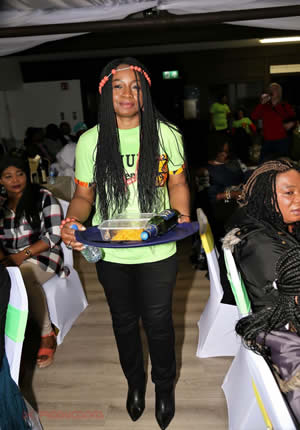- New research on diversity and impact of religious belief in 21st-century Ireland
- The Irish are very welcoming, but not very open to diversity
- Boris Johnson is our biggest threat to peace in Ireland and Europe alike
- All not what it seems behind creche doors
- There may be troubles ahead...
- Lunar landing or loony conspiracy?
- Nigeria needs a peaceful solution
- Soccer really is a sport for all
- Nepalese potato kabab
- Book Review

By Michaela Althouse
Charity work never tasted so good as Igbo women in Dublin banded together to raise money for those less fortunate in Nigeria.
 Umunwanyi Olaedo Dublin held an event recently to raise funds for those living with Hansen’s disease. The food, all traditional Nigerian dishes, was cooked by members of the organisation and sold to the public, who also made small donations.
Umunwanyi Olaedo Dublin held an event recently to raise funds for those living with Hansen’s disease. The food, all traditional Nigerian dishes, was cooked by members of the organisation and sold to the public, who also made small donations.
“The response was amazing,” says the organisation’s president Ijeoma Obioha. “People responded because they all know what is going down in Nigeria and they love how people are helping.”
People from all walks of life came to support the cause – especially due to the uniqueness of Nigeria food and its rare presence in the Dublin dining scene.
Umunwanyi Olaedo Dublin works to build relationships among and to help Igbo women in Ireland. It meets once a month to discuss cultural and community-building issues, and organises events to encourage integration within Irish society.
Their focus, they say, is on enriching life for women and promoting family values. “A stable family is like the gem of society,” says Obioha.
The organisation held a similar event last year, raising food donations for the homeless in Dublin. This time, however, they decided to give the food instead of receiving it, and send the proceeds back to Nigeria.
Obioha notes that the Nigerian economy is unstable, and with regular outbreaks of conditions such as Hansen’s disease, also known as leprosy, many are in need of more than just food.
It was an important decision for Olaedo, she says, because it encourages its members to remember where they came from.
For Igbo women in Ireland, Obioha says, one of their biggest issues is the marriage of cultures among Nigerians in the diaspora. There has to be a balance between promoting their own background and immersing in Irish life, though many are moving towards western ideas. It is important to have both, she says, to prevent marginalisation.
“I’m not trying to degrade their culture, but I want the women of Ireland to appreciate Nigerians and their culture [too].”
At the group’s own meetings, Obiola encourages members to be vocal, reasoning that while one cannot force people to integrate, one can still talk to them about it and begin the conversation, perhaps even persuading those in need to be confident enough to ask for help.
Umunwanyi Olaedo also gets involved with events that are traditionally Irish, such as marching in the St Patrick’s Day Parade. And by promoting stable family life, the group also hopes to let Nigerian ideals flourish in a new environment. “Every culture has positives … and we try to promote those values,” says Obioha.
The organisation has gone through multiple stages, including a name change, but their current phase began in 2011 and continues to grow. Members are usually added through word of mouth; people see their focus on family or are attracted by their charity work.
Along with her associates, Obioha organises the events and meetings, and works to co-ordinate women and get them interacting and speaking with one another.
She also acts as a liaison with the Igbo Union Dublin, the men’s organisation of which they are a branch. But mostly she is there to help create a better life for Igbo women in Ireland.
“We felt like we should be able to help raise funds for these people who need us,” she says. “We’d be an impact on society, and our culture as well.”







